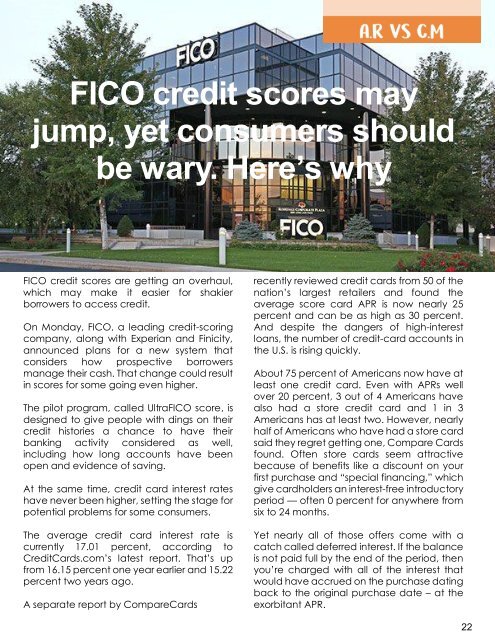FOREX Magazine
IBP Finance I
IBP Finance I
Create successful ePaper yourself
Turn your PDF publications into a flip-book with our unique Google optimized e-Paper software.
FICO credit scores may<br />
jump, yet consumers should<br />
be wary. Here’s why<br />
FICO credit scores are getting an overhaul,<br />
which may make it easier for shakier<br />
borrowers to access credit.<br />
On Monday, FICO, a leading credit-scoring<br />
company, along with Experian and Finicity,<br />
announced plans for a new system that<br />
considers how prospective borrowers<br />
manage their cash. That change could result<br />
in scores for some going even higher.<br />
The pilot program, called UltraFICO score, is<br />
designed to give people with dings on their<br />
credit histories a chance to have their<br />
banking activity considered as well,<br />
including how long accounts have been<br />
open and evidence of saving.<br />
At the same time, credit card interest rates<br />
have never been higher, setting the stage for<br />
potential problems for some consumers.<br />
The average credit card interest rate is<br />
currently 17.01 percent, according to<br />
CreditCards.com’s latest report. That’s up<br />
from 16.15 percent one year earlier and 15.22<br />
percent two years ago.<br />
A separate report by CompareCards<br />
recently reviewed credit cards from 50 of the<br />
nation’s largest retailers and found the<br />
average score card APR is now nearly 25<br />
percent and can be as high as 30 percent.<br />
And despite the dangers of high-interest<br />
loans, the number of credit-card accounts in<br />
the U.S. is rising quickly.<br />
About 75 percent of Americans now have at<br />
least one credit card. Even with APRs well<br />
over 20 percent, 3 out of 4 Americans have<br />
also had a store credit card and 1 in 3<br />
Americans has at least two. However, nearly<br />
half of Americans who have had a store card<br />
said they regret getting one, Compare Cards<br />
found. Often store cards seem attractive<br />
because of benefits like a discount on your<br />
first purchase and “special financing,” which<br />
give cardholders an interest-free introductory<br />
period — often 0 percent for anywhere from<br />
six to 24 months.<br />
Yet nearly all of those offers come with a<br />
catch called deferred interest. If the balance<br />
is not paid full by the end of the period, then<br />
you’re charged with all of the interest that<br />
would have accrued on the purchase dating<br />
back to the original purchase date – at the<br />
exorbitant APR.<br />
22


